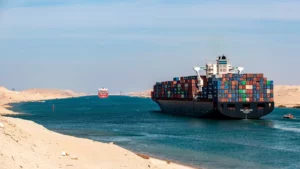Global maritime trade, which accounts for 80% of international exchanges, is experiencing significant disruptions.
Key routes, the Red Sea and the Panama Canal, face reliability issues due to rebel attacks and adverse weather conditions, respectively.
These disruptions are particularly impactful on oil and gas markets, which are heavily reliant on the Red Sea for transport.
The Red Sea and Panama Canal together handle about 20% of global maritime trade.
The Red Sea is a critical passage for oil, gas, and various cargo types. Oil tankers make up a significant portion of the vessels in this region.
Recent traffic has seen a 30% decline in the Panama Canal and 10% in the Red Sea, with the World Container Index (WCI) rising by 195% since the Panama disruptions.
Oil, sensitive to geopolitical events, has been moderately impacted.

The Bank of America (BofA) warns that escalating Middle East tensions could sharply drive up oil prices.
Similar to the 2021–2022 supply chain crisis, current trade interruptions could increase freight rates, delivery times, and energy prices, potentially leading to global inflation.
This impact extends beyond oil and gas markets to other commodities.
Global Market Dynamics
Longer delivery times are shifting consumption patterns to avoid stock deficits.
BofA predicts 2024 Brent oil at $90, citing market balance. Long-term forecasts lowered due to the sluggish U.S. economy.
Goldman Sachs highlights the significant influence of Red Sea disruptions on oil, along with structural regional mismatches between supply growth sources and demand.
These reduced maritime flows have intensified the shortage in tanker markets.
For steel, extended delivery times and higher freight costs could maintain high global prices.
However, excessive costs might redirect the market, with steel possibly being reallocated to Latin America.
The paper and pulp sector appears less impacted, but redirecting exports to Latin America could increase local prices.
Maritime trade challenges underscore global market interdependence, emphasizing the necessity of adaptive strategies to mitigate disruptions.

